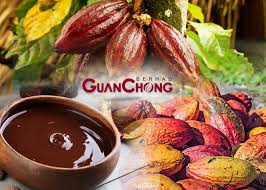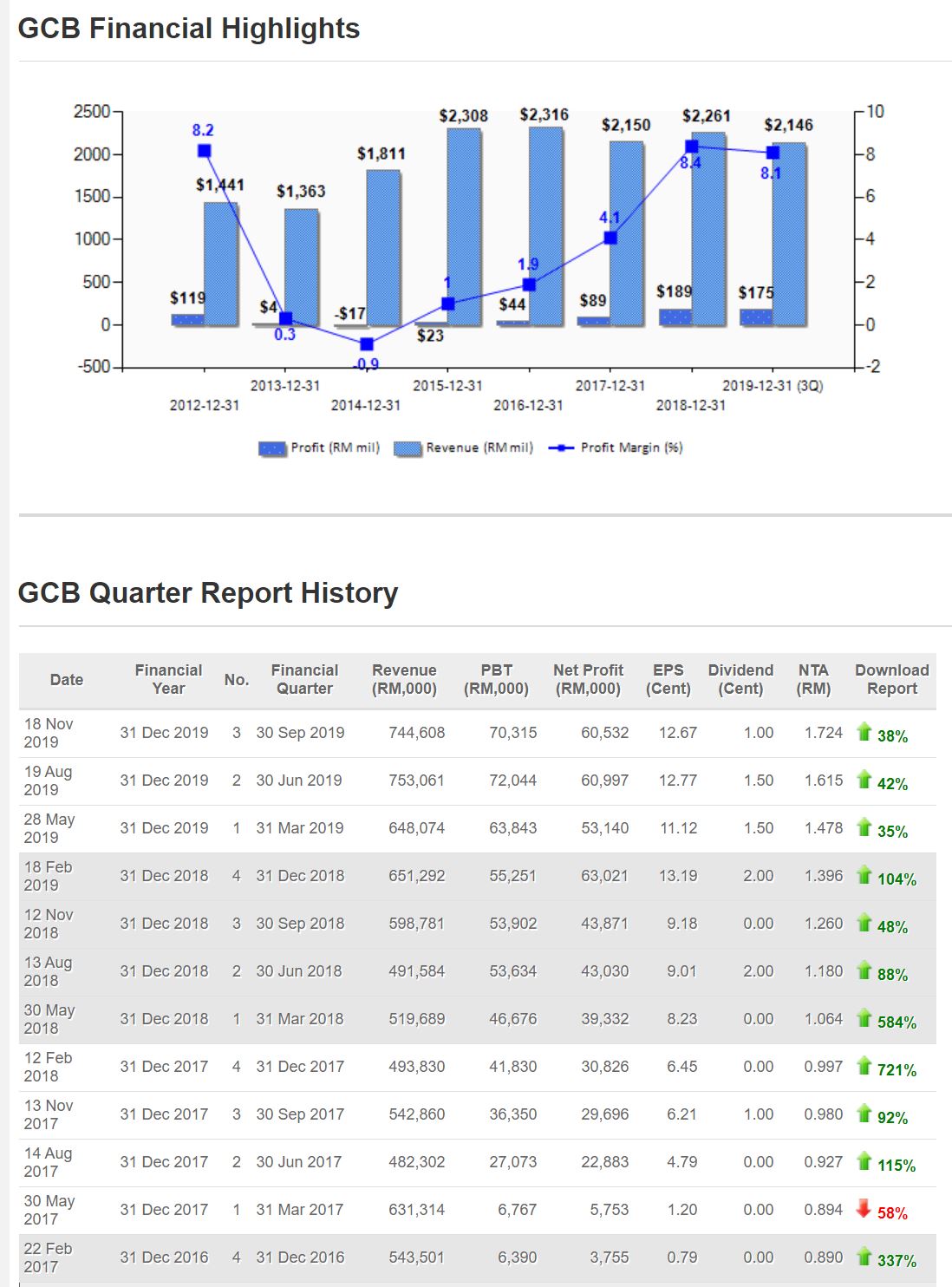Malaysia Stock Analysis Report – GCB (5102)


Guan Chong Berhad (GSB) is a family business based in Johor that
started cocoa trade in Johor since 1980 and now is the largest cocoa
processing plant in Asia today. Currently, there are total 3 processing
plants in Malaysia and Indonesia. One of the processing plants in
Malaysia has just completed the expansion in the first quarter of this
year. The production capacity increased from the original 9,000 tons to
50,000 tons, bringing the overall annual production capacity to 250,000.
Ton.
Within 3 years, GCB's stock price has grown from around RM 1.2 to
today's RM 4.6, an increase of more than 280% and an annual increase of
57%.
The company have just issued bonus issues and issue warrants on
November 5, 2019. As long as investor hold 3 units of GCB shares on
November 4, 2019, investor will receive 3 units of bonus shares and 1
unit of warranty and the stock price will be adjusted (divided by 2).
GCB is the largest local cocoa processing producer with an annual grinding capacity of 250k MT per year.
Its main business focuses on cocoa processing, which includes
processing cocoa beans into cocoa semi-finished products such as cocoa
powder, cakes, butter and wine.
It has production facilities in Johor and Indonesia and a mill for cocoa cakes and butter in the United States.
GCB's cocoa ingredients are sold under the 'Favorich' brand and are
widely used in the manufacture of chocolate, confectionery, food and
beverages, and many related industries worldwide.
Of these businesses, approximately 36% are local and the remaining 64%
are overseas. The main overseas businesses are Singapore and Indonesia.
Many of GCB's customers are world-renowned chocolate and consumer
brands, including Nestle, Mars and Hershey ’s, but these customers
already account for half of GCB's turnover.
Raw material costs are one of the company's main costs, accounting for
approximately 35%. The company's main ingredient is Cocoa Beans. After
the 2014 Ebola outbreak caused a shortage of global cocoa beans,
Now the supply of cocoa beans has returned to normal, and the price has
also recovered from the peak of about $ 3,300 / MT to the current price
of about $ 2,400 / MT.
From FY2015 to FY2017, the company's turnover showed a decline, but
this is not because of the company's ability to decline, the real reason
is as follows:
FY2016: The company restructured and sold 3 subsidiaries that were
previously able to contribute to the company's RM 84 mil turnover.
However, with the efforts of the marketing team, the increase in sales
of cocoa cake and cocoa powder offset this effect.
FY2017: The selling price of the company's cocoa products fell by an
average of about 10%. However, this did not cause any profit damage to
the company, because the company's raw cocoa beans also fell sharply,
down 30%.
In FY2018, the company's turnover increased mainly due to the increase
in sales of cocoa ingredients, which offset the impact of the decline in
selling prices.
Although the company's turnover is not stable, the company is still
capable of growing profits. The average annual growth rate of the
company's pre-tax profit is close to 80%, and the number is very
amazing.
In FY2018, the company's pre-tax profit reached RM 209 mil, of which RM
22 mil was a one-time loss. After removing the effect of one-time loss,
the company's pre-tax profit increased by about 83% year-on-year.
In FY2014, the company showed a loss, which is also the first loss in
history. It is mainly due to the decline in margin caused by the
excessive supply of cocoa ingredients, coupled with the rise in the US
dollar, which caused high sales costs and borrowing costs to form
foreign exchange losses. Downturn.
At that time, however, management expressed confidence that those
challenges could be overcome and stood out again when the cocoa market
returned to normal. Later, GCB also proved that they did.
In general, GCB is a high-quality company that has continued to grow.
Even if the industry market is sluggish, GCB has the ability to overcome
challenges and recover quickly. This proves once again the strength of
GCB.
Management expects global demand for chocolate to continue to grow.
Based on the strong demand from Asian consumers for chocolate, the
company aims to double its production capacity to 500,000 tons in the
next five years. As the cocoa bean production in Malaysia and Indonesia
declines, the company is exploring the expansion into Africa or South
America to ensure an adequate supply of cocoa beans.
In response, management is also actively increasing market share in the
cocoa ingredients manufacturing market. The main strategy is to
increase grinding capacity and expand the geographic scope of the
business.
In addition, management expects the business environment to be less volatile as of December 31, 2019 (FY2019).
As global demand for chocolate is expected to grow strongly, management
expects the company's overall performance to remain positive.
The company will continue to focus on exploring new markets for its
broad range of cocoa ingredients, optimizing production and expanding
overall grinding capabilities based on market conditions.
Despite the challenges in 2014, GCB was able to recover in a short period of time, and it is undeniably a very good company.
As the company's prospects are optimistic, the price of cocoa beans is
stable, and the company has been expanding. It is believed that the next
performance will be good, and the PE is expected to be lower.
GCB recently reduced its dividend payout and used the saved funds to
expand. In other words, it is to use the money that should have been
distributed to current shareholders for expansion. Unless the stock
price reflects the future value, it is very unprofitable for
shareholders to sell stocks before the results of the expansion.
https://klse.i3investor.com/blogs/LouisYapInvestment/2020-01-08-story-h1482068353-Malaysia_Stock_Analysis_Report_GCB_5102.jsp
Louis Yap
Facebook:
Web Site:
